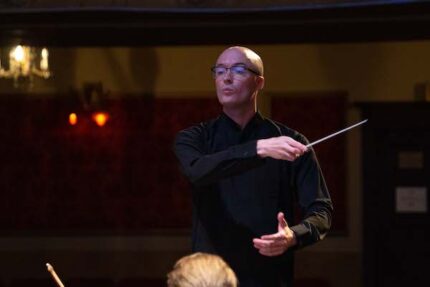Lakeview Orchestra offers a worthy concert of German music

Less is more, said architectural hero Ludwig Mies van der Rohe, but he wasn’t talking about Romantic music.
The Lakeview Orchestra, Chicago’s premier nonprofessional orchestra, played a program of Wagner, Strauss and Beethoven Sunday that showcased the ensemble’s comfort in the Germanic strain of the Romantic tradition. The group’s playing showed its characteristic steadiness and open ears, evidence of living within the music and extensive preparation. The next step for them is to really let it rip.
For example, in Beethoven’s Symphony No. 8, the anchor of the program, the notes were all there, even at the impressive tempo set in the fourth and final movement by Gregory Hughes, the orchestra’s artistic director and principal conductor. Difficult passages launching off rapid-fire triplet figures held tightly, notably when single sections played them alone. The time put in at rehearsal to internalize these rhythms at this tempo, and to align with the conductor’s cue, was evident.
Hughes, much to his credit in leading a nonprofessional group, couldn’t be easier to follow. His beat pattern is crystal-clear, his left hand is expressive, and he practically dances the character he wants the music to take.
The orchestra, however, does not quite meet him at his level of enthusiasm. At the finale, Hughes practically jumped on the podium to juice the final crescendo, but the orchestra did not find a turbo gear in their gearbox. Similarly, in the second movement’s off-balance accents, a light-hearted joke in musical gesture, Hughes leaned into the syncopation with his body, but the orchestra played like they didn’t get the punch line.
Beginnings of all movements felt noticeably secure and overall, the charming effect of the Eighth did come through in a jolly and vivacious performance.
The rarity on the program was Richard Strauss’s Duet Concertino for Clarinet and Bassoon, with soloists drawn from the orchestra. Strauss scored the piece, a throwback to late Romanticism when it was written in 1948, for the woodwind soloists backed by strings plus harp.
The piece opens with two violins, two violas, and a single cello and bass, readying the frame for the clarinet to enter. The intimate, chamber effect, so reminiscent of Strauss’s near-contemporaneous sextet from the opera Capriccio, was breathtaking here, especially when clarinetist Richard Zili picked up the peaceful vibe from the strings and molded it into long, beautiful phrases in the clarinet’s high register.
Zili’s playing remained enthralling throughout. His navigation of the full range of the instrument, finding countermelodies while jumping between registers, was masterful. The winds of Lakeview Orchestra are its strongest section, and Zili is one reason why.
The bassoon soloist, Victoria Long, was more workmanlike in her approach to the piece, owning the phrasing less than Zili and bringing less solo personality to her role in a rare opportunity for a bassoon to take the spotlight. Nonetheless, her solid and accurate part proved her a worthy counterpart to Zili.
The program’s opener, to put first things last, was the prelude to Act I of Wagner’s Die Meistersinger von Nürnberg. The initial statement of the familiar theme in Hughes’s hands took on a nobility and authority from the strong brass. Dynamic swells worked effectively, but without very high highs or very low lows.
The Lakeview Orchestra still carries some telltale signs of its nonprofessional status. Tuning can still be ragged within sections, especially the higher strings. Some tempos can seem like compromises—though not the zippy final movement of the Beethoven. And there’s often a flattening of character into a more bland, pastel interpretation than the energetic Hughes clearly hopes for.
Yes, less can be more—fewer instruments in the opening of the Strauss made for the best moment of the concert, to give one example. But in the sturm und drang of Romantic music, understatement is a harder effect to pull off.
Jeffrey Parthun conducts the Lakeview Orchestra program on April 14. The program includes Shostakovich’s Festive Overture, Bizet’s Carmen Suite No. 1, and Tchaikovsky’s Variations on a Rococo Theme with Young Artist Concerto Competition winner Jan Vargas Nedvetsky. lakevieworchestra.org
Posted in Performances



Posted Feb 20, 2024 at 2:18 pm by C A
It should be mentioned that the space has some challenged acoustically, including some contribution to the “flatness” of the sound. Thank you for casting some light on this group- the level is truly amazing for an all-volunteer group.